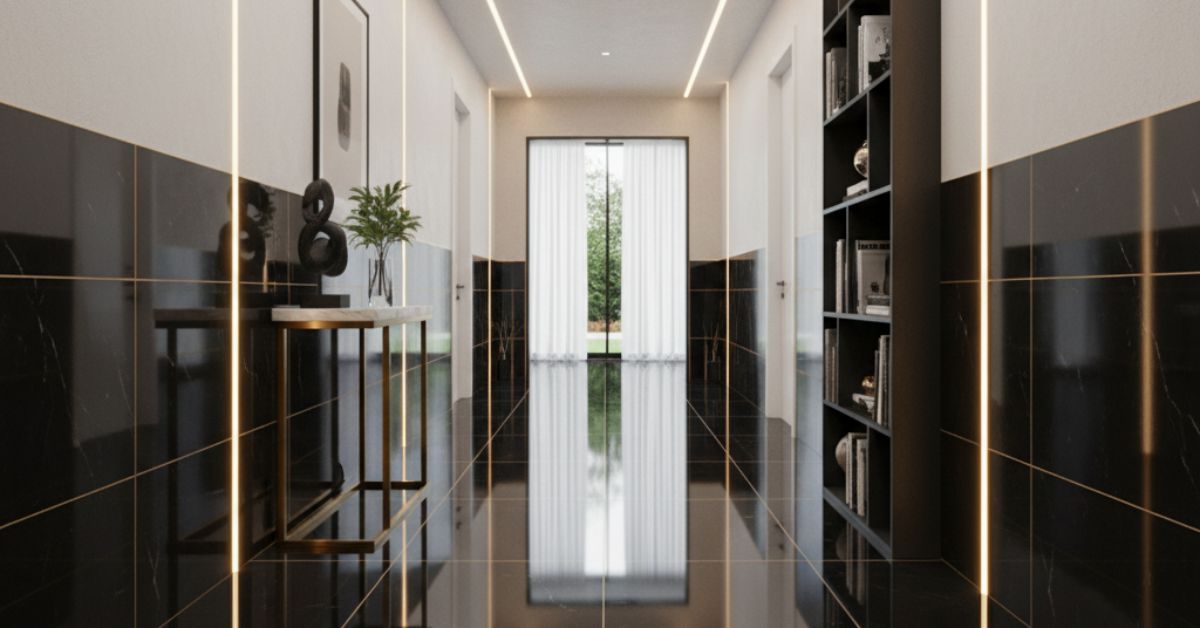Glossy black tiles add drama and elegance to any home. They shine under light, create depth, and set a bold modern tone. People use them to make kitchens, bathrooms, and living areas feel more stylish.
This guide explores what makes glossy black tiles unique, how they reflect light, why they show streaks, the best ways to clean them, and how they compare with matte finishes. It will also answer common questions so you can decide if they suit your space.
What Are Glossy Black Tiles?
Glossy black tiles are made with a polished surface or glazed finish that bounces light. Unlike matte tiles that absorb light, glossy tiles reflect it like a mirror. The black colour deepens the look, giving walls or floors a rich, sleek style. These tiles come in a range of materials:
-
Porcelain: Dense, durable, and low in water absorption. Ideal for bathrooms and kitchens.
-
Ceramic: More budget-friendly, often used for wall designs.
-
Marble: High-end and luxurious, but needs sealing and care.
-
Glass: Ultra-reflective, great for backsplashes and statement walls.
Glossy tiles can be cut into many shapes and sizes. Common sizes include small mosaics, 100×100 squares, or large 600×1200 mm slabs. Edges may be rectified, meaning sharp and even for thin grout lines, or pressed, which need wider joints. Each option changes the look of the final design.
Light Reflectance
Glossy black tiles are popular for how they play with light. A polished finish bounces light around the room, while the black body adds a sense of depth. This creates a balance of shine and shadow.
Natural light
In rooms with windows, glossy black tiles catch daylight and scatter it across walls or floors. On bathroom walls, this effect can make a compact space look taller. In kitchens, reflections add energy and movement.
Artificial light
Lighting choice changes how glossy tiles look. Warm bulbs around 2700K create a cosy glow and pair well with brass or copper. Neutral to cool lighting around 3500K–4000K makes the tiles look crisp and modern, perfect for industrial or minimalist interiors. High colour rendering index (CRI) bulbs help keep the black tone true without odd tints.
Style impact
Designers often use glossy black tiles to create luxury. They suit monochrome schemes with white cabinets or stand out against natural wood. Paired with chrome or gold, they give a polished finish that elevates the room.
Challenges
Glossy tiles can produce glare, especially if lights shine straight at them. They also reveal uneven surfaces and grout lippage more than matte tiles. Careful installation and angled lighting reduce these issues.
Streaks and Smudges
The same shine that makes glossy tiles attractive can highlight marks. On black tiles, streaks and smudges show up quickly. Soap film, mineral spots, fingerprints, and cooking splashes become clear under light.
Where streaks appear
-
Bathrooms: Shower walls and splash zones where water dries and leaves marks.
-
Kitchens: Areas near sinks and hobs where steam, grease, or splashes settle.
-
Hallways: Feature walls and skirtings that pick up handprints or dust.
How to reduce streaks
-
Install a water softener or wipe down shower walls with a squeegee.
-
Clean with microfibre cloths that lift dust and oil without streaking.
-
Choose darker grout to blend in with black tiles and reduce visible lines.
-
Keep joints narrow with rectified tiles for a seamless, sleek look.
Although glossy tiles need more wiping, many homeowners find the look worth the effort.
Cleaning and Maintenance
Caring for glossy black tiles is simple with the right routine.
Daily or weekly cleaning
-
Dust with a dry microfibre cloth or mop to remove loose dirt.
-
Wipe with a pH-neutral cleaner to cut grease and soap without harming the glaze.
-
Rinse with clean water to remove residues.
-
Buff dry with a towel for a streak-free shine.
Deep cleaning
For heavy build-up, use a diluted neutral detergent and a soft sponge. In hard-water areas, apply a manufacturer-approved descaler to dissolve minerals, then rinse well. Avoid abrasive powders or pads that can dull the surface.
Long-term care
Seal natural stone like marble to protect against staining. Avoid ammonia, bleach, or harsh alkaline cleaners that damage polish. Do not apply oily sprays or waxes that leave films. With proper care, glossy tiles will stay sharp for years.
Where to Use Glossy Black Tiles
Glossy black tiles work best in spaces where their shine enhances design.
-
Bathroom walls: They add spa-like luxury, especially in showers.
-
Kitchen splashbacks: Easy to wipe and striking against cabinets.
-
Feature walls: Living rooms or entrance halls become bold with glossy panels.
-
Fireplace surrounds: Reflect firelight for a dramatic effect.
They are less suited to outdoor areas or wet floors, as they can be slippery. For floors in busy or wet areas, matte or textured tiles with higher slip resistance are safer.
Glossy vs Matte Black Tiles
Glossy and matte tiles each have strengths. Choosing between them depends on lifestyle, safety needs, and design goals.
|
Feature |
Glossy Black Tiles |
Matte Black Tiles |
|
Light |
Reflective and bright |
Absorbs light, soft look |
|
Style |
Bold, modern, sleek |
Subtle, rustic, natural |
|
Streaks |
Shows marks quickly |
Hides dust and stains |
|
Care |
Needs regular wiping |
Easier upkeep |
|
Slip |
More slippery when wet |
Better traction |
|
Best Use |
Walls, splashbacks, features |
Floors, patios, high-traffic areas |
Glossy tiles create high drama, while matte tiles offer practicality. Many homeowners mix the two- glossy on walls, matte on floors for balance.
FAQs
Do glossy black tiles make a room dark?
No. Their shine reflects light and often makes rooms brighter despite the dark colour.
Are glossy tiles safe for floors?
They can be slippery, especially when wet. For bathrooms and kitchens, choose tiles rated for slip resistance or use them only on walls.
Which grout colour works best?
Charcoal or black grout creates a seamless look. White grout gives contrast but shows dirt faster.
Do glossy tiles scratch?
They resist scratches if cared for properly, but harsh pads or grit can cause marks.
Can glossy tiles be used outdoors?
Glossy tiles are less ideal outdoors due to glare and slip risk. Matte or textured finishes are safer.

